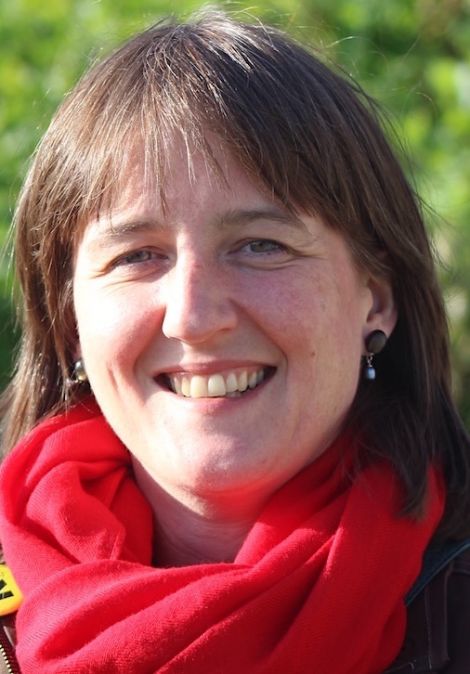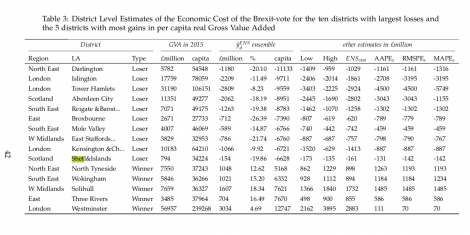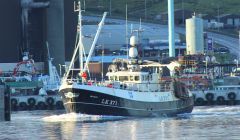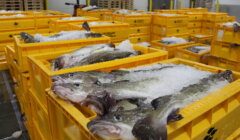Brexit / Shetland worse hit by Brexit than most other UK areas – research suggests
LEAVING the European Union is already costing every Shetlander more than £6,600 in lost economic activity, new research from the University of Warwick suggests.
The study, which is based on assumptions on how the economy may have behaved with and without the Brexit vote, identifies 168 UK districts that have lost economic activity since the vote in June 2016.
Shetland is the second worst hit area in Scotland, and the tenth worst in the UK, costing the local economy an estimated £154 million and resulting in a drop of GDP of 18.7 per cent compared to how the economy would have developed without Brexit.
In comparison, Orkney’s GDP appears to be 13.6 per cent lower, equivalent to a loss of economic activity of around £3,800 per resident.
And while Aberdonians have lost as much as £9,000 per resident, the people of the local authority area of Westminster, in London, gained £12,747, or 4.69 per cent.
Thiemo Fetzer and Shizhuo Wang of Warwick University said their research was based on “well established academic methods” and had uncovered significant geographical disparities of the economic impact of Brexit.
They found that just 78 districts in the UK have benefited from Brexit so far while they also suggested that the Covid-19 pandemic will have a greater negative impact on areas already hit hard by the Brexit process.
The findings were highlighted by SNP Highlands and Islands MSP Maree Todd who said the report was “further evidence” that “Shetland will be absolutely hammered by Brexit”.
“Today’s analysis has made clear that any form of Brexit will inflict major harm on Scotland’s economy – people in Shetland are already over £6,600 less well off thanks to these Tory Brexiteers,” she said.
Become a member of Shetland News
“The very last thing our economy needs on the back of the Covid-19 crisis is to be dragged out of the EU single market and customs union.”
The research, published last week, coincides with the announcement of a £100 million islands growth deal, which is expected to result in government funded investments in Shetland of around £33 million over the next 10 to 15 years.
Shetland Islands Council (SIC) chief executive Maggie Sandison said the council was well aware of the significant economic damage the Brexit process was having long before the end of the transition period at the end of December this year.
“The lack of clarity on Brexit and what the economy will look like in 2021 is having an impact on day to day business decisions,” she said.
The SIC is in the process of compiling an input/output report which is expected to become available in October, and which is likely to give a clearer picture of the impact of Brexit as well as the Covid-19 pandemic.
Sandison said the figures suggested by the University of Warwick did sound credible to her.
She added: “Economic uncertainty has an impact on business investment and consumer confidence and that is what is coming through in terms of those figures.”
Associate professor at Warwick University Dr Thiemo Fetzer said the methodology used in his research was used around the world to establish what would have happened to an economy had history or policy scenarios been different.
“It is sound thing to do because we know that the economy in much of the rest of the world did grow whereas there was a significant slowdown in growth in the UK post 2016,” he said.
“And this paper shows that there is a distinct regional signature to that slowdown in growth where some areas are hit much more than others.”
“The research finds that the costs of the Brexit vote to date may already exacerbate the very same regional inequalities that became all too apparent during the 2016 referendum vote. Much of the employment growth since 2016 is not supported by productivity growth, leaving those jobs on a shaky foundation.”
During the EU referendum four years ago, 56.5 per cent of Shetlanders voted in favour of remaining part of the European Union despite huge dissatisfaction locally with the shortcomings of the Common Fisheries Policy.
The study from the University of Warwick can be found here.
Become a member of Shetland News
Shetland News is asking its many readers to consider paying for membership to get additional features and services: -
- Remove non-local ads;
- Bookmark posts to read later;
- Exclusive curated weekly newsletter;
- Hide membership messages;
- Comments open for discussion.
If you appreciate what we do and feel strongly about impartial local journalism, then please become a member of Shetland News by either making a single payment, or setting up a monthly, quarterly or yearly subscription.

















































































